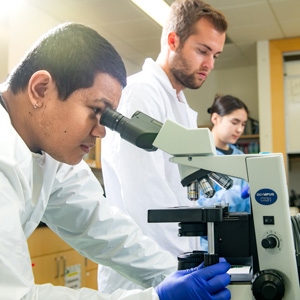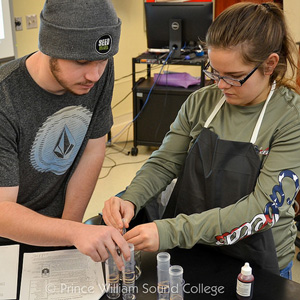Associate of Science
Associate of Science
The Associate of Science (AS) prepares students to enter the workforce or to go on to a science-related or health-related bachelor's degree. The AS provides an academic foundation in natural and social sciences, as well as preparation in the liberal arts through general education courses.
With the assistance of an academic advisor students may tailor the program to prepare for a particular baccalaureate major in natural, social, or clinical sciences.
Requirements
- 60 Credit Hours
- Minimum 2.0 GPA
Please view the current catalog for a list of all required classes for this program.
Program Quick Facts
Cost Per Credit: $241 (for both in-state and out-of-state students); Grants, scholarships, and other financial aid is available for qualifying students and programs.
Location: Can be completed on-campus in Valdez or online
Questions?
For more information about this program and to enroll you can contact PWSC Student Services:
email: pwsc.student.services@alaska.edu
call: 907-834-1600 (Mondays-Friday, 8 a.m.-5 p.m. AKST)
What can you do with an Associate of Science degree?
An Associate of Science is a two-year degree with a broad curriculum that emphasizes mathematics and natural sciences. This degree provides a strong academic foundation but not specific career training, leaving the door open for a wide range of professional pathways depending on your goals. The Associate of Science program is designed for students who want to complete foundational studies that can be applied toward a four-year degree. The degree is also a great starting point for entry-level technical and science-based careers.
Complete all the core requirements for a bachelor’s degree before declaring a major.
Bachelor’s degree programs
The Associate of Science degree is also very portable to other universities, making
transferring to a bachelor's program easy — within the University of Alaska system
or anywhere else.
-
- B.S. in biological sciences
- B.S. in computer sciences
- B.S. in nursing science
- B.S. in electrical engineering
- B.S. in geomatics
- B.S. in mechanical engineering
- B.S. in environmental sciences
From information technology to healthcare and beyond, there are numerous career pathways available for graduates.
- information technology
- healthcare
- natural resource management
- engineering

Self discovery:
General science curriculum creates opportunities to explore interests and discover abilities to help identify compatable careers or future educational pathways.

Prepare for a career:
This degree prepares graduates to obtain entry-level work as an entry-level technician across many science based industries.

Work toward a degree:
This two-year degree prepares graduates for continued education in a bachelor’s degree program. The science elective courses will prepare students to transfer into a degree program that hones skills in an area of interest. Complete all the core requirements for a bachelor’s degree before declaring a major.









